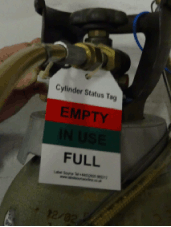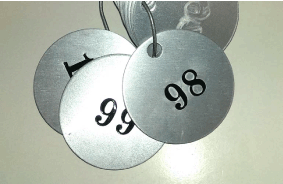Last week, BBC News reported on a proposal from the Sentencing Council that could see businesses in England and Wales hit with £20 million fines in cases of corporate manslaughter. If approved, this proposal will allow for signficantly harsher penalties on corporations whose negligence leads to a person's death.
In a nutshell, this means that companies could soon be paying a far higher price for fatal health and safety violations. This would make basic H&S measures more crucial than ever - many injuries and, yes, even deaths could have been prevented by such mundane things as safety labels and hazard warning signs. If the maximum fine is raised to £20,000,000 then corporations will be keener than ever to comply with regulations and provide a truly safe environment for their employees and the general public.
Really, though, the money shouldn't enter into it. If it takes a multi-million pound fine to make companies care about protecting human lives, we need to start asking some serious questions about those companies. The potential for fatal injury should be more than enough to spur business owners into action, and so while the BBC News report does indeed give companies an additional incentive to take health and safety seriously, we at Label Source would like to think that it will make no difference to responsible companies, who will always see the loss of life as a far graver penalty than any financial punishment.
Gas Cylinder Tags are used to protect workers, and help identify the content of cylinders. These inform the workforce whether the cylinders are full, empty or status tag (full, in use,empty). These tags assist the safe transport, handling and storage and maintenance of the gases, which are stored under pressure in the cylinders. These can be used on a range of different gases including, oxygen, nitrogen, argon, carbon dioxide and many more.

The high quality, sturdy tags can be used in a diverse number of industries including dispensing beverages, chemical processing, industrial applications, medical and much more. These are used to ensure a safe working environment. We provide a range of associated products from our hazard warning diamond range which includes compressed gas and non-flammable compressed gas, and GHS gases under pressure hazard label.
Our ranges of tags are diverse and can be used for a number of different things such as labelling cylinders, canisters, or pressure receptacles containing LPG.
Here at Label Source we have a range of underground warning tapes and pipeline tapes available in a variety of colours and for a variety of scenarios. Many, however, are unaware of what exactly underground warning tape actually is, so we've decided to write a quick blog post to let you know exactly what our pipeline tapes are, what they're used for and how they can benefit you.

1. What is underground warning tape?
Underground warning tape is a pipeline tape that will mark buried or sub-surface cables, mains, ducts, sewers and of course pipelines. The underground warning tape is usually fluorescent in colour with large, bold text for easy readability and should be installed near the surface to provide early warning of any utility location, including those for gas, electricity, telecommunications and water services. Our pipeline take is manufactured from 50 micron virgin grade low-density polyethlene and contains no PVC. All our underground warning tapes comply with a number of standards, including:
2. What is it used for?
Underground warning tapes are designed to highlight any cables with are buried or sub-surface to raise awareness and help reduce any risk of hazards. They will prevent damage and injury during work and excavation and will warn passers by of exact utility location. Our underground warning tapes can be used to label and identify any of the following:
- Buried electrical mains
- Fire mains
- Gas pipelines
- Street lighting cables
- CCTV lines
- Underground TV/telephone wires
- Fibre optic cables
- Road ducts
- Traffic signal wires
3. How can it help me?
Pipeline cables will not only help you identify the exact location of your work from previous days, it will provide awareness of the electrical cables submerged beneath the ground to any passers by, minimising the risk of tripping. Underground warning tapes also comply with health and safety standards, which will protect yourself, your workers and any general public who come across your products.
Make sure you identify any of your underground cables with our underground warning tape. For any help call Label Source on 0800 3761 693 today.
Label Source does not only supply a range of blank valve tags, we also have a wide range of valve marking products for your requirements. Valve marking tags can be used for marking and identifying different pipes and valves in many different industries. These come in different materials ranging from brass tags which are strong and durable to plastic tags which are solvent, acid and alkali resistant and are ideal for internal use.
Our wide range of Valve tags includes serial number tags in brass, plastic, aluminium and coloured aluminium. Label Source valve tags are also available in custom printed tags available in brass or plastic. These custom printed tags are made for your requirements, with special numbering, special text, or a combination of both. Both of these Serial number tags and Custom printed tags are suitable to mark valves, pressure regulators, drainage points, control levers, actuators, process plant and production equipment. We also supply valve control tags, to be used to identify if the valve is closed or open.

All of these valve tags are ideal for industrial use, factories, large companies and offices, to mark and identify pipe and valves. Identification on valves may be needed in different areas, as many types of valves need ongoing repairs and maintenance, and in some cases identification is required on several parts of the valve—on the valve body, on the bottom of the valve, or underside.
For further information on our range of valve tags please contact our sales office on:
On 08003761693 in the UK
or +441443842769 for international calls outside of the UK
or email us on sales@labelsource.co.uk
UN labels are self-adhesive black and white labels that are designed to be affixed to vehicles that are carrying hazardous chemicals and substances. Their marine-grade adhesive ensures that they are suitable for practically any vehicle, including cars, vans, lorries, trains, ships, and airplanes. They look like this:
How do UN labels identify hazardous materials?
Every UN label bears a four-digit number that corresponds to a specific substance. For instance...
- UN 1210 refers to printing inks.
- UN 1986 indicates the presence of flammable alcohol.
- UN 2810 is the UN number for pesticides and weed killers.
These numbers were assigned by the United Nations Committee of Experts on the Transport of Dangerous Goods (UNCETDG), and so each number is an international standard for the identification of its respective substance.
Who needs to display UN labels?
According to UN regulations, any vehicle containing potentially hazardous substances of any kind should be identified as such with the relevant UN label(s). This applies to vehicles travelling by road, rail, air and sea.
How do I find out the UN number for a specific substance?
A comprehensive list of UN numbers can be found on Wikipedia.
Do Label Source sell a label for every UN number?
Not quite. We do have a very wide range, covering all of the most common eventualities, but if you need a number that we don't stock, you can always purchase a blank UN label with a write-on panel.
Click here to see our full range of UN labels.